An Instagram and TikTok phenomenon, the young makeup artist from Brussels Naomi Waku aka Namglam is inspiring a whole generation of women with her empowering makeup creations. For the “Beautés bruxelloises” collective exhibition, the artist and influencer is leaving her virtual bubble to beautify the walls of the Qartier space in the Beurs/Bourse pre-metro station.
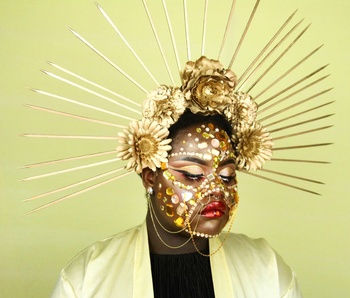
Naomi Waku: “For me, putting on makeup is putting on a mask. It’s a magical transformation that takes place.”
With 75,000 followers on Instagram at the time of the interview and 77,000 at the time when this was written, as well as 28,600 subscribers on TikTok, the hype surrounding Naomi Waku aka Namglam grows a bit more every day. The 27-year-old from Brussels made a name for herself in makeup art with audacious and eclectic creations that range from light and glamourous evening makeup to total transformations. Depending on her inspiration and state of mind, Namglam sometimes becomes a cosmic creature, sometimes an African mask or a demon of the night. Her face then becomes nothing more than an oval canvas on which her imagination can run free.
Challenging beauty standards by celebrating the beauty of being yourself, Naomi Waku has made herself the voice and the face of an entire generation of women. A statement that the influencer has recently begun to translate into canvases that combine paint and fabric which increasingly invoke the magical powers of the mask. After being shown for the first time in the collective exhibition “Congo Eza”, curated by the Wetsi Art Gallery and Café Congo, a larger range of Naomi Waku's work can now be seen alongside works by the visual artist and painter Zeinabou Hamidou Diori in the Qartier space in the Beurs/Bourse pre-metro station (a collaboration between Brussels Mobility, the MIVB/STIB, and Zinnema, organised by the Cabinet of Brussels minister Pascal Smet), in conjunction with the “Beautés bruxelloises” exhibition.
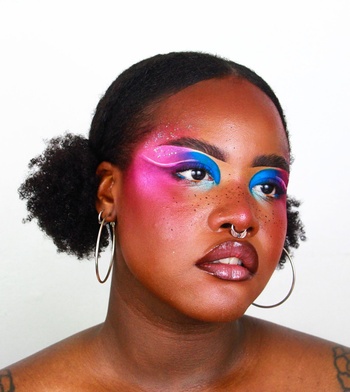
Naomi Waku celebrates beauty in all its facets.
It is curated by the three inspiring women responsible for Résidences Art: Florence Akyams, Nola N'Guessan, and Audrey Kauer. Due to the lockdown, we met with Naomi Waku via Zoom. She was surrounded by little pots of face paint, a vast array of brushes, and a large ring light.
The Instagram community knows you by the pseudonym Namglam. What is glamour to you?
Naomi Waku: Ah, glamour! (Laughs) For me, it's feeling pretty, but with something extra. When you're getting ready for a night out, it's lipstick or the little stroke of eyeliner that makes that beauty shine. It's that additional thing that makes you feel extra-pretty.
Was glamour part of your life from a very early age?
Waku: When I was a teenager, I went through every possible and imaginable style. I even went through an emo phase. (Laughs) I was pretty into makeup. The fact that it was practically impossible for me to find makeup for my complexion forced me to be creative. When I would go round cosmetics shops with my girlfriends, I was constantly confronted with the fact that there were no concealers or foundations for me. Before I became a makeup artist, I thought that bright lipsticks were not for me. I thought the same about eyeshadows with no pigments. I remember I used MAC eyeshadow to do contouring. (Laughs) It was not right at all! But I had no choice. At the time, I wore makeup to feel pretty and to hide my spots. (Laughs) Now, when I put makeup on, it's a statement. I hardly ever wear makeup in everyday life because, these days, I am comfortable au naturel.
After finishing secondary school in Brussels, you went to the fashion academy in Antwerp, which was considered one of the three best institutions of its kind in the world.
Waku: I was eighteen at the time. I could draw and sew a little, but I had not yet defined myself creatively. I had no idea how to construct a concept and I think that the Antwerp academy is a better fit for people who already have some level of experience. It didn't work for me because I didn't really receive much guidance and I was put down more than anything else. Because I was told that it was not for me, I ended up believing it. It's a pity, because fashion was really my dream. I stopped to preserve my mental health and then I went through a rather difficult period. But in the end, none of that really matters because now, I am creating my own way.
When I started doing makeup, I didn’t consider it art. Now, I appreciate what I do but I also respect it as art
Do you feel that in the world of makeup there was more space to express yourself?
Waku: Yes, much more! There are so many possibilities in makeup. Also, when I started out, there were not that many black girls like me who were doing artistic makeup. I carved out a little niche for myself and now there are loads of us, which is great.
On Instagram, you provide a lot of support for your black makeup artist colleagues via a series of hashtags.
Waku: That's really important. Because, as black influencers and content creators, we have a lot less visibility. One of my colleagues created #editorialblk, which enables us to support one another. It's great because now, Instagram is our platform too. It also encourages us to be more vocal. If we see that brands are not taking us into account for their foundation lines, for example, we will express that. Nowadays, that's no longer accepted. Brands have to include everyone and that's really great.
In your Instagram posts, you also shine a spotlight on your followers; you often turn to them for suggestions or advice.
Waku: Since more and more people are following me, I want them to participate, and I want to make them feel good. That way, we all grow together.
What is the most surprising or inspiring thing that a follower has suggested to you?
Waku: One time, a woman who follows me in the US asked me to send her a photo of one of my looks to print and hang in her salon. Although I receive tons of comments and support, I sometimes feel like my followers are not speaking to me but to Namglam. In that moment, everything suddenly seemed very real.
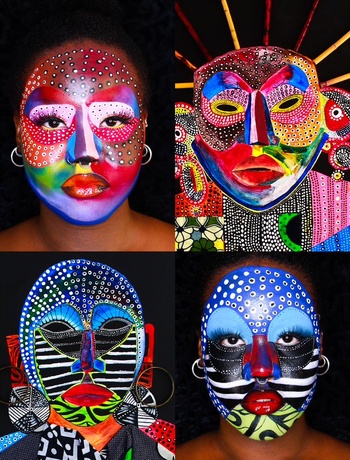
Naomi Waku translates her statement into canvases that combine paint and fabric which increasingly invoke the magical powers of the mask.
Nowadays, Instagram is as much an art gallery as any physical gallery.
Waku: It's a gallery and it's a business card. When I started doing makeup, I didn't consider it art. Now, I appreciate what I do but I also respect it as art. Makeup is like painting. In fact, it is painting. In the future, I would like to sell more prints of my work.
The “Beautés bruxelloises” exhibition in the Qartier space, in which you combine makeup and paint on canvas, is helping to bring your work out of the virtual world.
Waku: It's a wonderful opportunity and I am grateful to the curators of Résidences Art and Zinnema for having confidence in me. Since I was given carte blanche for “Beautés bruxelloises”, I thought of the aunties of Matongé, those very eccentric women who are part of the Brussels landscape. They are our mothers, our aunts, our grandmothers. Congolese, African women who are all around us.
What particularly inspired you about those aunties?
Waku: I discovered them going to get my hair done in Matongé. Their exuberant personalities, their outrageous looks and makeup have always interested me. Some of them dress in traditional clothing, others wear bold materials such as leather and heels. It can be considered tacky but over time, I came to appreciate that kind of “bad taste”. The aunties do not give a damn what other people think of them and have no intention of changing. I love that kind of energy and I wanted to present a beauty that I can identify with. In my canvases, the aunties are combined with my meditations on African masks and their highly ornamental aspect. I then recreate those canvases on my face in order to embody them.
The mask is one of the themes that run through your work. On Instagram, you sometimes opt for a completely black background with a light illuminating the made-up part of your face, so that all that is left is a mask emerging from the shadow.
Waku: I am fascinated by masks. For me, putting on makeup is putting on a mask.
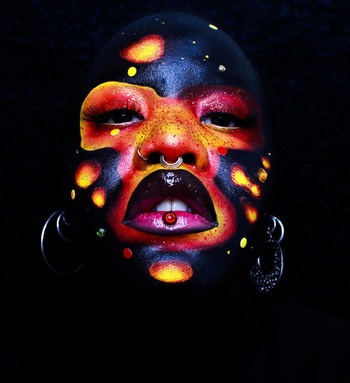
Naomi Waku aka Namglam wows followers around the world with her daring makeup creations.
What does it feel like when you're wearing that mask?
Waku: It's a magical transformation that takes place: I look at myself and I am a different person. I think: wow! Makeup allows me to express emotions that are buried within me. If I have the blues, sometimes I will express it through blue makeup. It's almost therapeutic.
You also sometimes create creepier makeup looks with a hint of gore. Is that your dark side expressing itself?
Waku: That part of my work is tied to my inner demons. I am a very happy person but I can get down sometimes. When my makeup becomes darker, it means things are not going all that well. (Laughs) In times like that, painting helps me. Putting makeup on is a way for me to overcome those dark ideas, to make something out of them.
You also use white liner a lot.
Waku: For a long time, I thought that it was not beautiful to draw too much attention to my face. I was convinced that white and flashy colours would stand out too much and that I was better off sticking to a very neutral palette. Then, little by little, I gave them a try, until I really made colours one of my strengths. I deconstructed my attitudes to makeup and realised that colours on dark skin can be very beautiful. Now, I deliberately go for colours that make an impact.
Makeup helped me to develop lots of things that previously, as a black girl, I didn’t think I could explore. Now, I believe that there are no limits
Did makeup help you with that process of deconstruction?
Waku: Yes, there are a lot of things that I thought were not for me. Now, I believe that there are no limits. Even in terms of my own self-perception. Discovering the world of makeup helped me to feel prettier. Put that way, it sounds a bit sad, but it's the truth. Makeup helped me to develop lots of things that previously, as a black girl, I didn't think I could explore.
Because of a lack of models?
Waku: When you grow up without seeing people who look like you, it has an impact on you. Of course, Instagram, which is a very powerful tool when it comes to representation, has helped a lot. So has all the stuff about body positivity. Seeing different bodies on Instagram or in fashion shows is brilliant. It makes you feel like you have not been erased: that you exist. It enables people to deconstruct themselves and see themselves in a new way. To tell themselves: I matter!
The French musician and model Yseult, who now lives in Brussels, is playing a key role in those paradigm changes.
Waku: I need to meet her! (Laughs) We know some of the same people too. When I discovered her, I was blown away. We look a bit alike too. There's a similarity! (Laughs) What Yseult does is very beautiful to see. It's great stumbling across things on social media that make you feel good. When I started posting on Instagram, I followed a huge number of Insta models. My whole feed was made up of them and it was telling me: you are not good enough, you don't look like them. There were times when my self-image was extremely low. Starting to follow people like Yseult really changed things.
You now have more than 77,000 followers on Instagram and that makes you a source of inspiration too. What does that mean to you?
Waku: I am very slowly becoming aware of the impact my work can have on people. It makes me happy knowing that what I do inspires other people. I feel like I have accomplished something.
BEAUTÉS BRUXELLOISES
> August 2021, Espace Qartier (Beurs/Bourse pre-metro station), www.zinnema.be & residencesart.com
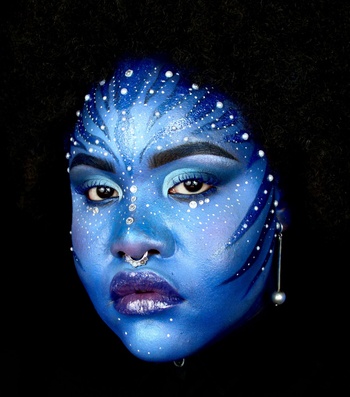
Read more about: Expo